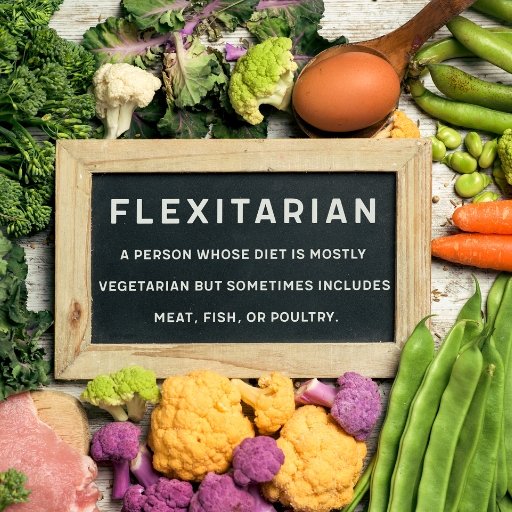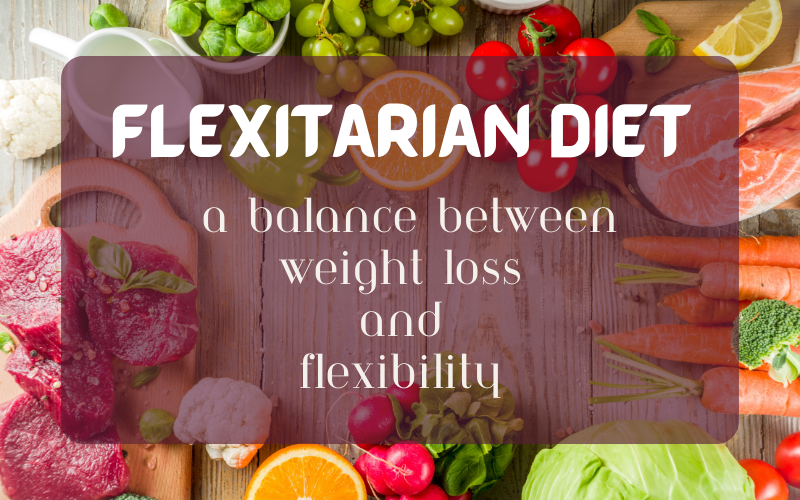The flexitarian diet is gaining popularity as a flexible and sustainable approach to healthy eating. It is a plant-based diet that allows for occasional consumption of meat and other animal products. By primarily focusing on plant-based foods, such as fruits, vegetables, whole grains, legumes, and nuts, individuals can reap the benefits of a vegetarian or vegan diet while still enjoying the flexibility of including small amounts of animal products. In this blog, we will explore the concept of the flexitarian diet, its benefits, and how to follow it effectively.
Table of Contents
How the flexitarian diet works
The flexitarian diet primarily consumes primarily plant-based foods rich in essential nutrients, fiber, and antioxidants. These foods promote overall health and well-being. The diet encourages individuals to prioritize fruits and vegetables, whole grains, legumes, and nuts. These plant-based foods provide a wide range of nutrients, including vitamins, minerals, and phytochemicals, which benefit the body.

While the flexitarian diet emphasizes plant-based foods, it also allows for the occasional consumption of animal products. This flexibility makes it easier for individuals to adhere to the diet and enjoy their favorite foods in moderation. Animal products, including meat, poultry, fish, eggs, and dairy, can be consumed in smaller quantities and less frequently. This approach ensures that individuals still obtain essential nutrients from animal products, such as protein, iron, and vitamin B12, while primarily relying on plant-based sources.
Health benefits of the flexitarian diet
1. Weight loss and management: The flexitarian diet can be an effective weight loss and management tool. People naturally consume fewer calories and less saturated fat by focusing on plant-based foods. Plant-based diets have been associated with lower body mass index (BMI) and reduced risk of obesity. Additionally, the high fiber content in plant-based foods promotes satiety, helping individuals feel fuller for longer and reducing the likelihood of overeating.
2. Reduced risk of chronic diseases: Plant-based diets, including the flexitarian diet, have been linked to a lower risk of chronic diseases such as heart disease, type 2 diabetes, and certain types of cancer. The abundance of antioxidants and phytochemicals in plant-based foods helps protect against oxidative stress and inflammation, which are underlying factors in developing chronic diseases. Additionally, the high fiber content in plant-based foods helps regulate blood sugar and cholesterol levels, reducing the risk of diabetes and heart disease.
3. Improved digestion and gut health: Plant-based foods are fiber-rich, promoting healthy digestion and preventing constipation. The flexitarian diet encourages the consumption of a variety of fruits, vegetables, whole grains, and legumes, which provide different types of fiber that support a healthy gut microbiome. A diverse gut microbiome is associated with improved digestion, nutrient absorption, and overall gut health.
Tips for following a flexitarian diet
1. Gradually reducing meat consumption: If you’re transitioning to a flexitarian diet, it’s helpful to start by incorporating more plant-based meals into your diet and gradually reducing your meat intake. This approach allows your taste buds and digestive system to adjust to the change. Begin by designating certain days of the week as meatless days and gradually increase the number of meatless meals you consume. To find alternatives you enjoy, experiment with different plant-based protein sources, such as tofu, tempeh, lentils, and beans.
2. Planning meals and incorporating variety: Planning your meals in advance is key to successfully following a flexitarian diet. This ensures a balanced and varied diet that includes a wide range of nutrients. Include a variety of fruits, vegetables, whole grains, legumes, and nuts in your meals to obtain different vitamins, minerals, and antioxidants. Experiment with other cooking methods, spices, and herbs to add flavor and variety to your meals.
3. Ensuring adequate nutrient intake: While the flexitarian diet can provide a wide range of nutrients, it’s important to pay attention to your nutrient intake, especially protein, iron, calcium, and vitamin B12. Plant-based sources of these nutrients include tofu, tempeh, lentils, spinach, almonds, and fortified plant-based milk. If needed, consider supplements or fortified foods to meet your nutritional needs. Consulting with a registered dietitian can also help you meet your nutrient requirements.
Introduction of a flexitarian diet into daily life
Transitioning to a flexitarian diet can be a gradual process that allows individuals to adjust to the changes in their eating habits. Here are some tips to help introduce a flexitarian diet into your daily life (3):

1. Start with small changes by incorporating more plant-based meals into your diet and gradually reducing your meat consumption (4). Replace one or two meat-based meals per week with plant-based alternatives. Experiment with different recipes and flavors to make the transition enjoyable.
2. Explore new foods: Embrace the opportunity to try new fruits, vegetables, grains, and legumes. Explore different cuisines that have a strong plant-based focus, such as Mediterranean, Asian, or Middle Eastern. This will help you discover new flavors and expand your culinary repertoire.
3. Find plant-based alternatives: Look for plant-based alternatives to your favorite meat-based dishes. Now, a wide variety of plant-based meat substitutes are available, such as tofu, tempeh, seitan, and plant-based burgers. These alternatives can help satisfy cravings and make transitioning to a flexitarian diet easier.
4. Be mindful of portion sizes: While the flexitarian diet allows for occasional consumption of animal products, it’s essential to be mindful of portion sizes. Aim to have smaller portions of meat and larger portions of plant-based foods. This will help you maintain a balanced diet and ensure that plant-based foods remain the focus of your meals.
Supplements to support weight loss goals
While a well-planned flexitarian diet can provide all the necessary nutrients for weight loss, some individuals may benefit from certain supplements to support their weight loss goals. Here are some supplements that can be considered (4)(5)(6):
1. Omega-3 fatty acids: Omega-3 fatty acids, found in fish oil or algae-based supplements, have been shown to support weight loss efforts. They can help reduce inflammation, improve insulin sensitivity, and promote fat burning. Omega-3 supplements can be particularly beneficial for individuals who consume limited amounts of fatty fish in their diet.
2. Vitamin D: Low vitamin D levels have been associated with weight gain and obesity. Supplementing with vitamin D may help support weight loss efforts, especially in individuals with vitamin D deficiency. Consult with a healthcare professional to determine the appropriate dosage for your needs.
3. Probiotics: Probiotics are beneficial bacteria that support a healthy gut microbiome. They can help improve digestion, reduce inflammation, and support weight loss. Look for a high-quality probiotic supplement containing various strains and follow the recommended dosage.
4. Fiber supplements: A fiber supplement can benefit weight loss if you struggle to meet your daily fiber intake through food alone. Fiber supplements can help promote satiety, regulate blood sugar levels, and support healthy digestion. Choose a soluble fiber supplement, such as psyllium husk or glucomannan, and follow the recommended dosage.
Remember, supplements should not replace a healthy diet and lifestyle. They should be used as a complement to a well-rounded flexitarian diet and weight loss efforts. It’s always best to consult a healthcare professional before starting new supplements.
We also recommend other diets:
Low Carbs Diet: Unveiling the Truth Behind Carbs and Weight Loss
Keto Diet for Beginners – 101 Guide to Getting Started with the Ketogenic Diet
Conclusion
The flexitarian diet offers a flexible and sustainable approach to healthy eating. Individuals can enjoy the benefits of a vegetarian or vegan diet without feeling restricted by primarily focusing on plant-based foods while allowing for the occasional consumption of animal products. The flexitarian diet promotes weight loss and management, reduces the risk of chronic diseases, and improves digestion and gut health. By gradually decreasing meat consumption, planning meals, and ensuring adequate nutrient intake, anyone can successfully follow a flexitarian diet and achieve a healthier lifestyle.
References:
1. Turner-McGrievy GM, Wirth MD, Shivappa N, et al. Randomization to plant-based dietary approaches leads to larger short-term improvements in Dietary Inflammatory Index scores and macronutrient intake compared with diets that contain meat. Nutr Res. 2015;35(2):97-106. doi:10.1016/j.nutres.2014.12.009 https://pubmed.ncbi.nlm.nih.gov/25532675/
2. Satija A, Bhupathiraju SN, Rimm EB, et al. Plant-Based Dietary Patterns and Incidence of Type 2 Diabetes in US Men and Women: Results from Three Prospective Cohort Studies. PLoS Med. 2016;13(6):e1002039. doi:10.1371/journal.pmed.1002039 https://pubmed.ncbi.nlm.nih.gov/27299701/
3. Tuso PJ, Ismail MH, Ha BP, Bartolotto C. Nutritional Update for Physicians: Plant-Based Diets. Perm J. 2013;17(2):61-66. doi:10.7812/TPP/12-085 https://www.ncbi.nlm.nih.gov/pmc/articles/PMC3662288/
4. Mozaffarian D, Wu JH. Omega-3 Fatty Acids and Cardiovascular Disease: Effects on Risk Factors, Molecular Pathways, and Clinical Events. J Am Coll Cardiol. 2011;58(20):2047-2067. doi:10.1016/j.jacc.2011.06.063 https://pubmed.ncbi.nlm.nih.gov/22051327/
5. Major GC, Alarie F, Dore J, Tremblay A. Calcium plus vitamin D supplementation and fat mass loss in female very low-calcium consumers: potential link with a calcium-specific appetite control. Br J Nutr. 2009;101(5):659-663. doi:10.1017/S0007114508030808 https://pubmed.ncbi.nlm.nih.gov/19263591/
6. Sanchez M, Darimont C, Drapeau V, et al. Effect of Lactobacillus rhamnosus CGMCC1.3724 supplementation on weight loss and maintenance in obese men and women. Br J Nutr. 2014;111(8):1507-1519. doi:10.1017/S0007114513003875 https://pubmed.ncbi.nlm.nih.gov/24299712/






Pingback: Night Fat Burner Weight Loss Supplement - Burn Fat Overnight - Healthy Living Journey
Pingback: Matcha Extreme: The Natural Path To Weight Loss Success